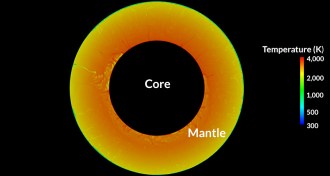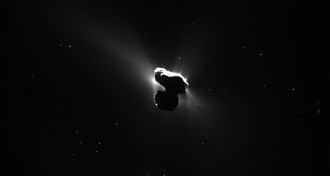Uncategorized
-
 Materials Science
Materials ScienceButterfly-inspired nanostructures can sort light
Scientists re-created a nanostructure found on butterflies that can separate out circularly polarized light, a characteristic that may be useful for telecommunications.
-
 Life
LifeScientists dig up proteins from the past
To learn how today’s proteins evolved, scientists are reconstructing ancient molecules.
-
 Climate
ClimateU.S. weather has gotten more pleasant, but will soon worsen
Warmer winters have made U.S. weather more pleasant since 1974 thanks to climate change, but that will soon change.
-
 Animals
AnimalsPandas have ultrasonic hearing
Giant pandas hear very high frequencies. Scientists still don’t know why.
-
 Astronomy
AstronomyYoung exoplanet found nestled close to its star
Scientists have found one of the youngest exoplanets ever, snuggled up close to its star.
-
 Earth
EarthPlate tectonics just a stage in Earth’s life cycle
Plate tectonics is just a phase in a planet’s lifetime between conditions that are too hot or too cold for the planet-churning mechanism, new simulations suggest.
-
 Neuroscience
NeuroscienceMorphine may make pain last longer
Instead of busting pain, morphine lengthened the duration of pain in rats with a nerve injury.
-
 Science & Society
Science & SocietyBiologist Kate Rubins’ big dream takes her to the space station
Molecular biologist Kate Rubins led a 14-person virology lab before becoming an astronaut. She heads to the International Space Station on June 24.
-
 Tech
TechNanoparticles beat back atherosclerosis
Nanoparticles that find and destroy waxy plaques in blood vessels could be the next big treatment for heart disease.
-
 Earth
EarthPioneering geophysicist’s theory of peak oil still debated
The life of geophysicist Marion King Hubbert, creator of the “peak oil” prediction, was intertwined with the politics and science of the oil industry.
-
 Life
LifeBacteria resistant to last-resort antibiotic appears in U.S.
For the first time in the United States, scientists have reported a patient infected with a strain of bacteria carrying the gene mrc-1, making it resistant to the last-ditch antibiotic colistin.
By Meghan Rosen -
 Planetary Science
Planetary ScienceComet 67P carries two ingredients for life: glycine, phosphorus
Two ingredients essential for all life, phosphorus and the amino acid glycine, have been found floating around a comet.